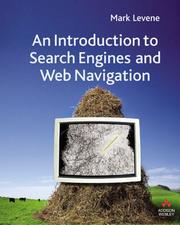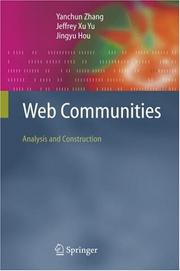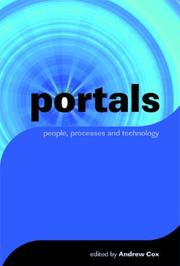| Listing 1 - 9 of 9 |
Sort by
|

ISBN: 0321306775 9780321306777 Year: 2006 Publisher: Harlow Addison-Wesley
Abstract | Keywords | Export | Availability | Bookmark
 Loading...
Loading...Choose an application
- Reference Manager
- EndNote
- RefWorks (Direct export to RefWorks)
The first chapters of the book provide an extensive introduction to search engines and navigation. No formal prerequisites are required; any Web enthusiast will enjoy reading the book. These chapters comprise of background and history of the Web, navigation and searching, search engine architecture and different types of search engines. In addition to the basics, additional topics covered are navigation (aka surfing), the interplay between search and navigation, Web data mining, personalization, the mobile web, social networks, collaborative filtering and Weblogs (aka Blogs). The book goes far beyond simple searching and navigation; it provides a comprehensive overview of the current research fronts in areas related to Web search engines and navigation. The text is highly readable with a large number of illustrations and examples. It can serve as an excellent textbook both for an introductory and a more advanced course of Web search and navigation. Each chapter starts with a listing of objectives and ends with a set of exercises relevant to the topics covered in the chapter. Students will especially benefit from the non-technical descriptions and clear explanations of the concepts. The book is also a great reference source for researchers and IT professionals: it includes 410 references to articles, and 202 references to Web pages and resources. I highly recommend the book
Information systems --- Web search engines --- Web search engines - Textbooks

ISBN: 0596009453 9780596009458 Year: 2006 Publisher: Beijing ; Sebastopol (Calif.) : O'Reilly,
Abstract | Keywords | Export | Availability | Bookmark
 Loading...
Loading...Choose an application
- Reference Manager
- EndNote
- RefWorks (Direct export to RefWorks)
Internet searching. --- Web search engines. --- Yahoo! (zoekmachine). --- Zoekmachines (Internet). --- Yahoo! (Computer file).
Book
ISBN: 291626003X 9782916260037 Year: 2006 Publisher: Paris : MM2 Éditions,
Abstract | Keywords | Export | Availability | Bookmark
 Loading...
Loading...Choose an application
- Reference Manager
- EndNote
- RefWorks (Direct export to RefWorks)
Analyse de l'environnement dans lequel l'entreprise Google s'est développée précédée d'un rappel historique. Google invente des relations économiques nouvelles, l'ouvrage permet de mieux comprendre comment cette forme de management peut modifier l'environnement professionnel.
Industrial management. --- Internet --- Organizational change --- Web search engines --- Organization --- industry --- Google (Firm)
Book
ISBN: 2843650836 Year: 2006 Publisher: Paris : ADBS éd.,
Abstract | Keywords | Export | Availability | Bookmark
 Loading...
Loading...Choose an application
- Reference Manager
- EndNote
- RefWorks (Direct export to RefWorks)
Internet --- Information retrieval --- Internet searching --- Search engines --- Library research --- Recherche de l'information --- Recherche sur Internet --- Moteurs de recherche --- Recherche documentaire --- Handbooks, manuals, etc. --- Guides, manuels, etc --- Guides, manuels, etc. --- Documentation
Book
ISBN: 2212119038 9782212119039 Year: 2006 Publisher: Paris : Eyrolles,
Abstract | Keywords | Export | Availability | Bookmark
 Loading...
Loading...Choose an application
- Reference Manager
- EndNote
- RefWorks (Direct export to RefWorks)
Internet industry --- Web search engines --- Internet searching. --- Information society --- Internet --- Moteurs de recherche sur Internet --- Recherche sur Internet --- Société informatisée --- Economic aspects --- Industrie --- Aspect économique --- Google (Firm) --- Google. --- InternetEconomic aspects --- Aspect économiqueGoogle (Firm)Google. --- Economic aspects.

ISBN: 1280608668 9786610608669 3540277390 3540277374 Year: 2006 Publisher: Berlin ; New York : Springer,
Abstract | Keywords | Export | Availability | Bookmark
 Loading...
Loading...Choose an application
- Reference Manager
- EndNote
- RefWorks (Direct export to RefWorks)
Due to the lack of a uniform schema for Web documents and the sheer amount and dynamics of Web data, both the effectiveness and the efficiency of information management and retrieval of Web data is often unsatisfactory when using conventional data management techniques. Web community, defined as a set of Web-based documents with its own logical structure, is a flexible and efficient approach to support information retrieval and to implement various applications. Zhang and his co-authors explain how to construct and analyse Web communities based on information like Web document contents, hyperlinks, or user access logs. Their approaches combine results from Web search algorithms, Web clustering methods, and Web usage mining. They also detail the necessary preliminaries needed to understand the algorithms presented, and they discuss several successful existing applications. Researchers and students in information retrieval and Web search find in this all the necessary basics and methods to create and understand Web communities. Professionals developing Web applications will additionally benefit from the samples presented for their own designs and implementations.
Web search engines. --- Vector spaces. --- Text processing (Computer science) --- World Wide Web. --- W3 (World Wide Web) --- Web (World Wide Web) --- World Wide Web (Information retrieval system) --- WWW (World Wide Web) --- Hypertext systems --- Multimedia systems --- Internet --- Processing, Text (Computer science) --- Database management --- Electronic data processing --- Information storage and retrieval systems --- Word processing --- Linear spaces --- Linear vector spaces --- Algebras, Linear --- Functional analysis --- Vector analysis --- Web searching --- World Wide Web searching --- Internet searching --- Search engines --- Web portals --- World Wide Web --- Subject access
Book
ISBN: 2744019801 Year: 2006 Publisher: Paris : CampusPress,
Abstract | Keywords | Export | Availability | Bookmark
 Loading...
Loading...Choose an application
- Reference Manager
- EndNote
- RefWorks (Direct export to RefWorks)
Annuaires électroniques (Internet) --- Google (firm) --- Index électroniques (Internet) --- Internet -- Moteurs de recherche --- Internet -- Outils de recherche --- Internet zoekmachine --- Outils de recherche sur Internet --- Web -- Moteurs de recherche --- Web -- Outils de recherche --- Web search engines --- Information retrieval --- Moteurs de recherche sur Internet --- Recherche de l'information --- Handbooks, manuals, etc. --- Computer programs --- Guides, manuels, etc --- Programmes d'ordinateur --- Google --- Google (Firm)

ISBN: 1856045463 9781856045469 9781856049832 1856049833 1306342295 Year: 2006 Publisher: London
Abstract | Keywords | Export | Availability | Bookmark
 Loading...
Loading...Choose an application
- Reference Manager
- EndNote
- RefWorks (Direct export to RefWorks)
First applied to internet gateways such as Yahoo, the concept of the portal" has evolved in a bewildering number of directions. Different themes of personalization, aggregation or integration seem to have dominated our understanding of what a portal should be at different times. Many organizations and institutions have borrowed the idea from the net to address local problems of integrating and presenting information sources to users - yet they have developed the concept in different ways. Meanwhile new models seem to be constantly emerging from the internet. Tracking this evolving concept is clearly of particular concern for information services. How can they best take advantage of internet portals to improve access to resources? What are the requirements for delivery of diverse content through a local portal? And how do portals run by libraries relate to wider organizational initiatives? This edited collection seeks answers to these questions, providing the library and broader information community with an overview of how portals are currently being used.
Web portals --- Internet --- Portails (Informatique) --- 025:681.3 --- 025:681.3 Bibliotheekautomatisering --- Bibliotheekautomatisering --- Gateways (Web portals) --- Internet portals --- Portals (World Wide Web) --- Web sites --- Federated searching --- Web search engines --- DARPA Internet --- Internet (Computer network) --- Wide area networks (Computer networks) --- World Wide Web --- Web portals. --- Internet.
Book
ISBN: 2842059700 9782842059705 Year: 2006 Publisher: Paris : Mille et une nuits,
Abstract | Keywords | Export | Availability | Bookmark
 Loading...
Loading...Choose an application
- Reference Manager
- EndNote
- RefWorks (Direct export to RefWorks)
Web search engines --- Electronic information resources --- Digital libraries. --- Library materials --- Libraries and the Internet. --- Information organization. --- Internet --- Internet industry --- Digitization. --- Social aspects. --- Documentation de bibliothèque --- Numérisation --- Google (Firm) --- Digital libraries --- Information organization --- Libraries and the Internet --- 02 --- Web searching --- World Wide Web searching --- Internet searching --- Search engines --- Web portals --- World Wide Web --- Digitalization of library materials --- Digitization of library materials --- Internet and libraries --- Computer industry --- Information storage and retrieval --- Organization of information --- Information science --- Information storage and retrieval systems --- Digital information resources --- Digital resources (Information resources) --- Electronic information sources --- Electronic resources (Information resources) --- Information resources --- Digital curation --- Digital media collections --- Digital media libraries --- Digital repositories --- Electronic libraries --- Electronic publication collections --- Electronic publication libraries --- Electronic text collections --- Repositories, Digital --- Virtual libraries --- Libraries --- Web archives --- 02 Bibliotheekwezen --- Bibliotheekwezen --- Social aspects --- Digitization --- Subject access --- Google Inc. --- جوجل (Firm) --- Jūjil (Firm) --- Jūjal (Firm) --- شركة جوجل المحدودة --- Sharikat Jūjil al-Maḥdūdah --- Sharikat Jūjal al-Maḥdūdah --- Gugolu (Firm) --- Гугъл (Firm) --- Gugŭl (Firm) --- Кукăль (Firm) --- Kukălʹ (Firm) --- گوگل (Firm) --- شرکت گوگل --- Shirkat-i Gūgul --- 구글 (Firm) --- Kugŭl (Firm) --- גוגל (Firm) --- Gugel (Firm) --- グーグル (Firm) --- Gūguru (Firm) --- Гугл (Firm) --- Gugl (Firm) --- Google. --- BackRub --- Moteurs de recherche sur Internet --- Bibliothèques virtuelles --- Documentation de bibliothèque --- Forecasting --- Numérisation --- Prévision --- Web search engines - Europe. --- Electronic information resources - Europe. --- Library materials - Digitization. --- Internet - Social aspects. --- Internet industry - Europe. --- Acqui 2006 --- Google --- Bibliothèques virtuelles
| Listing 1 - 9 of 9 |
Sort by
|

 Search
Search Feedback
Feedback About UniCat
About UniCat  Help
Help News
News